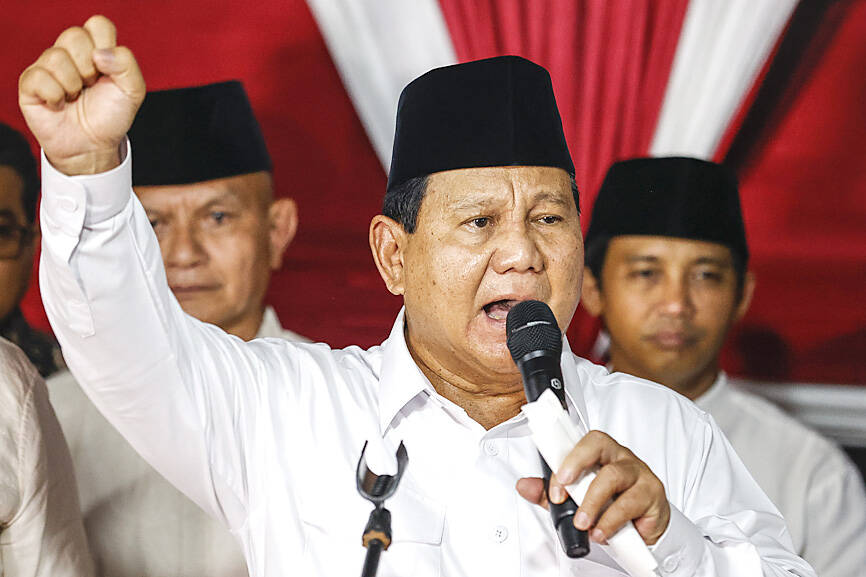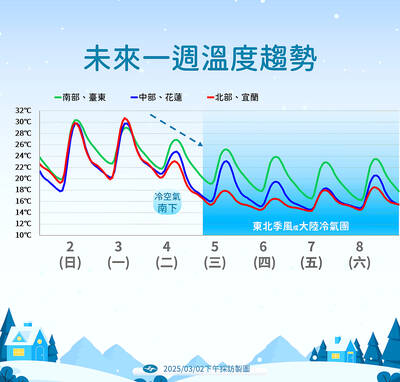Prabowo Subianto, a former special forces general with ties to Indonesia’s current president and past dictatorship, was confirmed the victor of last month’s presidential election over two former governors who have vowed to contest the result in court.
Subianto won 58.6 percent of the votes, while former Jakarta governor Anies Baswedan received 24.9 percent and former Central Java governor Ganjar Pranowo got 16.5 percent, the Indonesian General Election Commission said on Wednesday after the official counting was completed.
In Taipei, the Ministry of Foreign Affairs, on behalf of President Tsai Ing-wen (蔡英文) and Vice President William Lai (賴清德), yesterday congratulated the president-elect and vice president-elect, and commended the Indonesian people and government for completing a democratic and peaceful election.

Photo: EPA-EFE
Taiwan and Indonesia share the values of freedom and democracy and jointly face challenges related to climate change, food security and supply chain resilience, the statement said.
Taiwan hopes to continue deepening cooperation with Indonesia in economy and trade, culture, medical and health, science and technology, education, agriculture and labor based on existing friendly ties to jointly safeguard the freedom, openness, peace and prosperity in the region, it added.
Meanwhile, the two other Indonesian presidential candidates have alleged fraud and irregularities in the election process, such as the vice presidential candidacy of Indonesian President Joko Widodo’s son.
The popular outgoing president is serving his second term and could not run again, but his son’s candidacy is seen as a sign of his tacit backing for Subianto.
Widodo’s son, Gibran Rakabuming Raka, is 37, but became Subianto’s running mate after the Constitutional Court made an exception to the minimum age requirement of 40 for candidates.
The Constitutional Court’s chief justice, who is Widodo’s brother-in-law, was then removed by an ethics panel for failing to recuse himself and for making last-minute changes to the election candidacy requirements.
Subianto, who is Widodo’s defense minister, had claimed victory on election day after unofficial tallies showed he was winning nearly 60 percent of the votes.
Voter turnout for the Feb. 14 election in the world’s third-largest democracy was about 80 percent, the commission said.
Subianto won in 36 of 38 provinces and received 96.2 million votes compared with 40.9 million for Anies Baswedan, the second-place finisher, who won in two provinces.
Pranowo, the candidate of the governing Indonesian Democratic Party of Struggle, received 27 million votes and did not win any provinces.
Additional reporting by Liu Tzu-hsuan

SECURITY: The purpose for giving Hong Kong and Macau residents more lenient paths to permanent residency no longer applies due to China’s policies, a source said The government is considering removing an optional path to citizenship for residents from Hong Kong and Macau, and lengthening the terms for permanent residence eligibility, a source said yesterday. In a bid to prevent the Chinese Communist Party (CCP) from infiltrating Taiwan through immigration from Hong Kong and Macau, the government could amend immigration laws for residents of the territories who currently receive preferential treatment, an official familiar with the matter speaking on condition of anonymity said. The move was part of “national security-related legislative reform,” they added. Under the amendments, arrivals from the Chinese territories would have to reside in Taiwan for

CRITICAL MOVE: TSMC’s plan to invest another US$100 billion in US chipmaking would boost Taiwan’s competitive edge in the global market, the premier said The government would ensure that the most advanced chipmaking technology stays in Taiwan while assisting Taiwan Semiconductor Manufacturing Co (TSMC, 台積電) in investing overseas, the Presidential Office said yesterday. The statement follows a joint announcement by the world’s largest contract chipmaker and US President Donald Trump on Monday that TSMC would invest an additional US$100 billion over the next four years to expand its semiconductor manufacturing operations in the US, which would include construction of three new chip fabrication plants, two advanced packaging facilities, and a research and development center. The government knew about the deal in advance and would assist, Presidential

‘DANGEROUS GAME’: Legislative Yuan budget cuts have already become a point of discussion for Democrats and Republicans in Washington, Elbridge Colby said Taiwan’s fall to China “would be a disaster for American interests” and Taipei must raise defense spending to deter Beijing, US President Donald Trump’s pick to lead Pentagon policy, Elbridge Colby, said on Tuesday during his US Senate confirmation hearing. The nominee for US undersecretary of defense for policy told the Armed Services Committee that Washington needs to motivate Taiwan to avoid a conflict with China and that he is “profoundly disturbed” about its perceived reluctance to raise defense spending closer to 10 percent of GDP. Colby, a China hawk who also served in the Pentagon in Trump’s first team,

The arrival of a cold front tomorrow could plunge temperatures into the mid-teens, the Central Weather Administration (CWA) said. Temperatures yesterday rose to 28°C to 30°C in northern and eastern Taiwan, and 32°C to 33°C in central and southern Taiwan, CWA data showed. Similar but mostly cloudy weather is expected today, the CWA said. However, the arrival of a cold air mass tomorrow would cause a rapid drop in temperatures to 15°C cooler than the previous day’s highs. The cold front, which is expected to last through the weekend, would bring steady rainfall tomorrow, along with multiple waves of showers